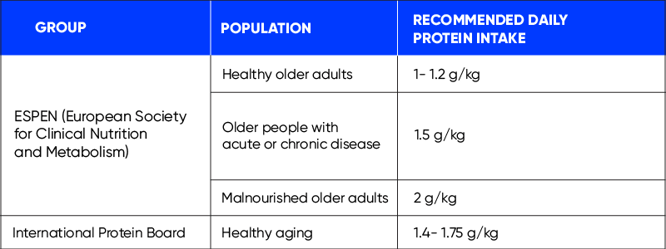WHEY CAN INCREASE PROTEIN LEVELS WITHOUT NEGATIVELY IMPACTING OVERALL DIETARY INTAKE IN OLDER ADULTS
Posted by Lindsey Ormond, Director of Research & Development on Dec 23, 2021 9:39:07 AM
Sarcopenia – the loss of muscle mass and strength that occurs naturally with aging – can be mitigated by ensuring sufficient protein intake. Reducing the rate of muscle loss is a key factor for maintaining a free and active lifestyle in the advancing years. However, since protein is the most satiating nutrient and appetite diminishes with age, it could be supposed that adding more protein to the diet could lead to an overall reduction in calorie and nutrient intake at a time when they are critical.
While the current UK recommended nutrient intake (RNI) for protein is 0.75g per kg body weight, and the US RNI is 46g for women and 56g for men, other groups have recommended higher levels to be optimal for this group, as shown in the table below.

However, many adults are not achieving their optimal intake, with 36% failing to meet the UK recommendations and a monstrous 85% failing to meet the ESPEN recommendations. Furthermore, protein intake tends to be skewed to the evening, though achieving 25-30g protein at each meal and spreading protein intake throughout the day has been shown to be optimal.
A recent study looked at whether adding a daily whey protein supplement in the form of a gel containing 20g whey protein impacted appetite and overall nutrient intake in 50–75-year-olds. In a cross-over design, Tuttiett et al (2021) also investigated whether there was any impact from having the whey gel in the morning after breakfast, or in the evening before bed.
The researchers found that the addition of a gel did not impact overall appetite or habitual macronutrient intake, i.e. they did not alter the amount of protein, fat and carbohydrate they naturally consumed when excluding the contribution from of protein from the gel. However, the gel did increase overall protein intake.

With regards to the timing of protein supplementation, there was no difference in hunger, satisfaction or eating desire between morning and evening feedings. Since protein intake is typical skewed to the evening, a post-breakfast protein supplement can offer a beneficial strategy to increase protein intake at a time when it is typically low.
Highlighted research paper: Tuttiett ER, Green DJ, Stevenson EJ, Hill TR, Corfe BM, Williams EA. Short-Term Protein Supplementation Does Not Alter Energy Intake, Macronutrient Intake and Appetite in 50-75 Year Old Adults. Nutrients. 2021;13(5):1711.
Further references and reading:
Department of Health. Dietary Reference Values for Food Energy and Nutrients Report of the Panel on Dietary Reference Values of the Committee on Medical Aspects of Food Policy; Report on Health and Social Subjects 41; HMSO: London, UK, 1991.
Bauer, J.; Biolo, G.; Cederholm, T.; Cesari, M.; Cruz-Jentoft, A.J.; Morley, J.E. Evidence-based recommendations for optimal dietary protein intake in older people: A position paper from the PROT-AGE Study Group. J. Am. Med. Dir. Assoc. 2013, 14, 542–559.
Paddon-Jones, D.; Rasmussen, B.B. Dietary protein recommendations and the prevention of sarcopenia. Curr. Opin. Nutr. Metab. Care 2010, 12, 86–90.
International Protein Board. Protein Matters: The Need to Re-evaluate the Adequacy and Application of Protein Requirements. https://www.internationalproteinboard.org/protein-matters/protein-requirements.htm
Topics: HUMAN NUTRITION
